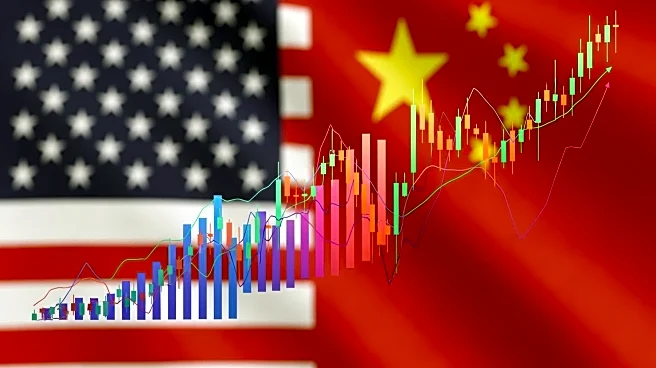What's Happening?
The U.S. stock market is experiencing heightened volatility as the VIX index, commonly referred to as the market's 'fear index,' has reached its highest levels in months. This increase in volatility is largely
attributed to renewed trade tensions between the United States and China. The VIX, which measures expected volatility in the S&P 500 over the next 30 days, rose to near 23, marking a significant jump from recent weeks. Despite this, the index remains below the peaks seen in April during intense trade-related uncertainty. The S&P 500 experienced a drop of up to 1.5% in early trading before rebounding, reflecting investor concerns over geopolitical conditions, tariffs, and trade uncertainties. JPMorgan Chase CEO Jamie Dimon highlighted the ongoing uncertainty in a statement, noting the complex geopolitical conditions and elevated asset prices.
Why It's Important?
The surge in the VIX index indicates a growing sense of fear among investors, which could have broader implications for the U.S. economy and stock market stability. High volatility can lead to increased risk aversion, prompting investors to seek safer assets such as gold, which has reached record highs. This shift in investor sentiment may impact sectors differently, with tech and discretionary stocks facing declines while consumer staples see gains. The current market conditions underscore the fragility of investor confidence amid geopolitical tensions and economic uncertainties. As debates continue over whether the market is in a bubble, the heightened volatility could influence investment strategies and economic forecasts.
What's Next?
If trade tensions between the U.S. and China persist, the stock market may continue to experience volatility, potentially affecting investor behavior and market dynamics. Stakeholders, including policymakers and financial institutions, may need to address these uncertainties to stabilize the market. Investors might increasingly turn to safe-haven assets, impacting asset prices and market liquidity. Monitoring geopolitical developments and trade negotiations will be crucial in predicting future market movements and investor sentiment.
Beyond the Headlines
The current market volatility raises questions about the long-term impact of geopolitical tensions on global trade and economic growth. The reliance on safe-haven assets like gold suggests a lack of confidence in traditional investment vehicles, which could lead to shifts in investment strategies. Additionally, the ongoing trade disputes may influence public policy decisions, potentially affecting international relations and economic partnerships.








